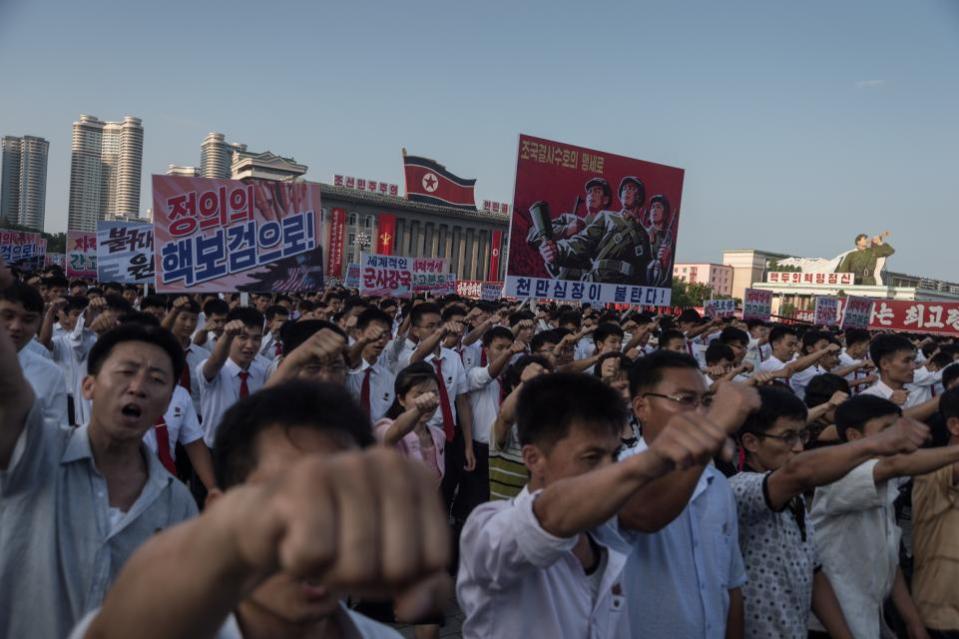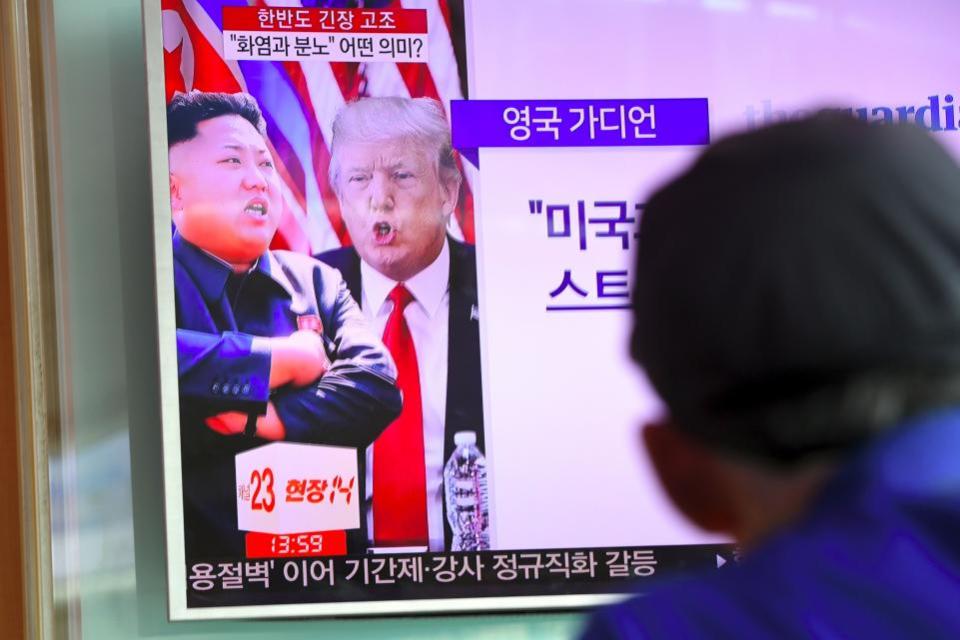Experts Dismiss North Korea and U.S. War as ‘Drama’
North Korean leader Kim Jong Un and President Donald Trump dismiss one another as irrational, warmongering heads of state, but experts say both men are more prone to theatrics than military action.
After months of flexing their respective armed forces, neither Trump nor Kim has backed off from the nuclear standoff that has developed on the Korean Peninsula, but those closely following the crisis said the chance of the two reluctantly finding common ground is greater than that of an all-out war. Despite harsh reactions to North Korea's recent release of a detailed plan to strike the U.S. island territory of Guam, intelligence analyst Joseph Bermudez emphasized Thursday that Kim, the world's youngest head of state, is doing what he can to prove he can lead his country while dealing with a particularly hostile U.S. administration.
Related: What war with North Korea looked like in the 1950s and why it matters now
"Kim Jong Un is not a stupid person. He is a very intelligent person. He is nuanced. He might be inexperienced at the international level," Bermudez said during a telephone conference call hosted by North Korea monitoring group 38 North, to which he is a frequent contributor.
"What we have to take into consideration is that he is the leader of the nation, a militarily powerful nation," he added. "He operates under a different set of requirements than other nations and leaders. He is operating on what he believes, on what his advisors believe, is the best for their country."

More than six years have passed since Kim became North Korea's third-generation leader, a position he inherited following his father's death in 2011. Since then, analysts have observed modest reforms in the way the economy is structured and a greater willingness on the leadership's part to seek advice from various experts and social scientists within the country. Robert Carlin, a visiting scholar at Stanford University's Center for International Security and Cooperation and former chief of the Northeast Asia Division of the State Department's Bureau of Intelligence and Research, says this change in attitude seems to have contributed to Kim's military accomplishments, as North Korean scientists are no longer "scared to death of failure."
While Kim's father may be credited with North Korea's first nuclear weapons test in 2006, the youngest Kim managed to conduct two successful intercontinental ballistic missile (ICBM) tests last month, putting the U.S. on the country's trajectory for the first time ever. Further analysis suggests North Korea has managed to miniaturize its nuclear warheads, of which it may have up to 60, to fit onto these missiles. North Korea's nuclear and ballistic weapons development has stirred outrage from the U.S., which considers such missiles to be a global threat.
"The problem is the dynamic between the Americans and the North Koreans. It’s not singularly with the North Koreans," Carlin said over the phone. "It’s the chemistry, the misunderstandings, misperceptions, that are so dangerous. And I think that applies in the current situation."
Upon hearing reports that North Korea was preparing a sixth nuclear weapons test in April, Trump dispatched a naval "armada" to the region and stepped up joint drills with U.S. allies Japan and South Korea. While no nuclear display ultimately appeared, North Korea's decision to conduct intermediate-range ballistic missile tests at an unprecedented rate and last month's ICBM tests kept tensions high between the two leaders. Just hours after Trump threatened North Korea Tuesday with "fire and fury like the world has never seen," North Korea's military unveiled a detailed blueprint to attack Guam, a move Carlin says was designed to achieve "maximum drama" rather than signal a call to arms.

Bermudez, Carlin and 38 North co-founder Joel Wit all note that, according to their analyses, there has been no major mobilization of the North Korean populace, something they would expect to see if a war was around the corner. Unlike in August 2015, when Kim put his country into a "semi-state of war" over cross-border fire exchanged between North Korea and South Korea, life in North Korea has apparently been going on as usual as its leader trades threats with "an American president who seems to have North Koreans writing his tweets and speeches," according to Wit, who is also a senior fellow at 38 North's parent institution, the U.S.-Korea Institute at Johns Hopkins University's School of Advanced International Studies.
The U.S. also appears to be operating contrary to its apocalyptic rhetoric. Secretary of State Rex Tillerson told reporters Wednesday that while he supported Trump's position, he believed the president's Hiroshima-esque tweet was designed to send "a strong message to North Korea in language that Kim Jong Un would understand, because he doesn’t seem to understand diplomatic language."
Related Articles


